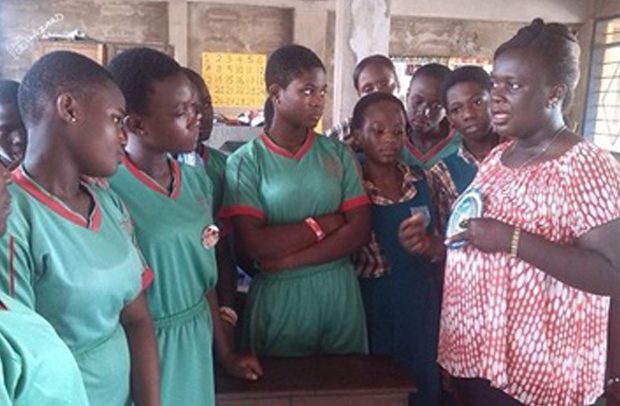Adolescent girls being taken through CSE
Adjoa Yenyi, an adolescent reproductive health specialist of the United Nations Population Fund (UNFPA), has debunked assertions that comprehensive sexuality education (CSE) promotes promiscuity.
On the contrary, Mrs. Yenyi said CSE, which is a holistic form of sexuality education that is age appropriate and culturally sensitive, helps people to be more careful and more decisive in the choices they make concerning their sexuality.
“I think it is the word sex in the term … but CSE is a global name that helps you to know what goes into the CSE curricular so what it does is it teaches you how to be assertive, recognize and prevent diseases, especially if you are sexually active because a lot of the youth are sexually active,” she explained.
Mrs. Yenyi was speaking on the sidelines of a media interaction on the comprehensive sexuality education as a tool for empowering adolescent girls in Accra.
The reproductive health specialist said CSE is a way of providing young people with information so that when they have to make decision about their sexual reproductive health, which they are faced with every day, especially as young people, they will know the right one to take.
“They have to be able to understand the signs so that when they get there they will know that this one will lead to this or that so let me do it this way instead,” Mrs. Yenyi added.
She pointed out that the reality in the country is that young people – whether it is socially acceptable or not – are sexually active.
“Are we going to leave them to be just sexually active? When there are ways they can prevent unwanted pregnancies and STIs so giving them the information to make the right choices will save a lot of lives of our young people,” the reproductive health specialist maintained.
She said people have certain opinions about the education of young people about sexuality but stated that government has consented to the teaching of CSE in both formal and informal educational setting emphasizing the need for such knowledge among Ghanaians.
Touching on the uptake of CSE in the country, Mrs. Yenyi said, “When you look at the countries in the sub-region Ghana is doing very well because we have seen the need to integrate it into our curriculum but we are not sure about how effective it is that is why we have the guidelines to help in the teaching of CSE.”
She said the UNFPA is looking forward to the implementation making sure that teachers are capable to teach it and do it the right way for the young people to get the appropriate information for their age and then monitoring to know if there are gaps or teachers need extra support in teaching CSE “so we can have it being as effective as possible.”
Mrs. Yenyi further observed that it is the hope of stakeholders that by the end of an adolescent stay in the senior high school, they would have a certain spectrum of information that helps them to make a good choice.
By Jamila Akweley Okertchiri


